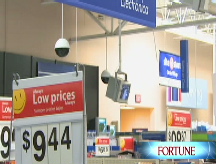Pricing: That old black magic
Will prices overall actually fall this year? Big, scary question.

NEW YORK (Fortune) -- So I met a magician the other night. For real. As in a guy who makes a living pulling rabbits out of a hat, mostly at corporate retreats and such.
He was absolutely first rate and had his audiences completely bewitched. But after the show, the magic man told me his business is way down, which isn't a surprise I guess. He told about how he was recently set to perform at an event held by big bank that had received TARP money. He was just about to go on stage when he was yanked back by some corporate wonk who told him that the bank had heard there was a reporter present and that it didn't want word to get out that they were paying for a magician's services. "I cost less than a couple of the bottles of wine they were serving," said the magician shaking his head. It's not a good time to be a banker and it looks like it's not a good time to be a magician either.
I started ruminating about the magician's sorry state and it actually got me thinking about prices and pricing in this economy. What makes for a good buy nowadays? How are prices changing as we move through this tumult? As it turns out we are at a peculiar moment when it comes to prices in our economy. Here's why. That stalwart, the CPI, or consumer price index climbed 0.3% in January. If you exclude energy and food (I know I know, economists don't eat or drive?) it was up 0.2%. This is not so interesting by itself. Much more intriguing is the yearly number for 2008. For the year just ended, inflation was... ZERO. That's right, last year prices on average, overall did not budge. It's also the lowest reading since prices actually fell 0.4% in 1955. Yet one more sign that we are living in unusual times.
So what does that mean? In one sense it means we are living on the edge.
High inflation is bad of course, but a little bit of inflation is a good thing and actually optimal. A moderate rate of inflation seems to make it easier for businesses to raise prices (which is good for growth) and allows employees to ask for raises. A little bit of inflation also encourages folks to invest their money instead of leaving it in their mattress. On the other hand, deflation, or falling prices, is a bad thing since it causes people to freeze up and delay purchases until prices are lower. This can induce a death spiral of deflation and economic contraction, which is what happened in Japan. Right now economists are much more concerned about deflation than inflation. No question, we are pulling in our spending horn right now, which seems to have eradicated inflation, now the question is, will prices fall?
Clearly prices are dropping in many instances, but will the CPI actually be down in 2009? Big, scary question.
It's interesting to run through the economy to see where prices are being slashed. Some of this has to do with a concept known as price elasticity.
The more elastic demand is for a product, the more customers will balk at paying high prices. Airfares are a great example. If airfares are too high, people can substitute flying to Florida by driving or by staying home and noodling around on Facebook instead. And so the Atlanta Journal Constitution not surprisingly reports that airfares for spring break this year are down 15% compared to last year.
Prices are down even more, of course, at your local quickmart, where a gallon of gas now costs $1.91 -- or less than half as much as it did last June ($4.08). This is an extremely competitive business, and of course the price of oil has plummeted and demand has dropped, which has led to a price rout that benefits everyone except for the poor dude who runs the Gas 'n' Go.
In retailing we all know prices have been slashed for clothes, jewelry and the like, but food prices have held more or less steady or even climbed in some instances. And then there's real estate. Home prices are plummeting, down more than 30% year over year in metro areas like Phoenix, San Francisco, and Las Vegas. Some good news and bad news. The good news: These drops are from record, unsustainable peaks. The bad news: The declines seem to be far from over.
So if you were a betting person, would you wager that prices overall will fall this year? Well, the wild card is energy, but other than that, it's tough to see prices going up. Just how badly this hurts the economy is a huge unknown. Hey, we made it through 1955, we will most likely make it through 2009.
As for the magician, I asked him if things were so bad that he was considering another line of work. Like getting a job in President Obama's economic team. "I do tricks for a living," he said. "I don't pretend to make miracles." ![]()
-
 The retail giant tops the Fortune 500 for the second year in a row. Who else made the list? More
The retail giant tops the Fortune 500 for the second year in a row. Who else made the list? More -
 This group of companies is all about social networking to connect with their customers. More
This group of companies is all about social networking to connect with their customers. More -
 The fight over the cholesterol medication is keeping a generic version from hitting the market. More
The fight over the cholesterol medication is keeping a generic version from hitting the market. More -
 Bin Laden may be dead, but the terrorist group he led doesn't need his money. More
Bin Laden may be dead, but the terrorist group he led doesn't need his money. More -
 U.S. real estate might be a mess, but in other parts of the world, home prices are jumping. More
U.S. real estate might be a mess, but in other parts of the world, home prices are jumping. More -
 Libya's output is a fraction of global production, but it's crucial to the nation's economy. More
Libya's output is a fraction of global production, but it's crucial to the nation's economy. More -
 Once rates start to rise, things could get ugly fast for our neighbors to the north. More
Once rates start to rise, things could get ugly fast for our neighbors to the north. More









